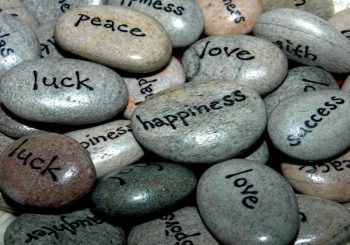 By Kashi
By Kashi
Guest Writer for Wake Up World
Whenever I sit down with a friend and I ask them what they really, really want out of life, the answer is always the same.
Health, happiness… and wealth.
And then…
World peace or unity and the end of hunger or suffering.
Our first or deepest desires for our own life are selfish because they are instinctual, but they are entirely natural and necessary and arise from our personality in order to care for the three aspects thereof; the physical body, the emotions or emotional body, and the mind.
Then, we desire unity and the end of suffering right across the world. These wishes tend to arise following a little thought and are fuelled by the empathy and compassion of our hearts and are reflective of our interconnectedness.
After each conversation, I am always left in wonder that not only do we all possess the same instinctual desires to flourish individually, but also together.
These fundamental desires or requirements are so vitally important to our lives, they can be considered sacred. Throughout our life, we will spend most of our time, energy and attention attempting to actualize them. They are inherent and they are what we all believe will bring us individual fulfillment, satisfaction and contentment, or harmony.
On a larger scale, it is safe to imagine that in order to accomplish world peace and unity, we would require personal harmony, en masse. Individually fulfilled, satisfied and contented, each of us would naturally conduct our lives in a manner conducive to our more altruistic requirements for life.
But so few of us have managed to accomplish personal harmony yet – and we have been trying for generations. Why is this? Are we looking in the wrong places? As a people, we seem to have tried just about everything we can possibly think of to fulfill our most basic desires, and yet they still elude most of us. Could we be wishing for the wrong things? Are we hard-wired to fail?
As we examine our three fundamental requirements for life more closely, we start to reveal the innaccuracy and outdatedness of our descriptions of them and how misunderstanding and mistranslation can leave us disempowered, unsatisfied and focussed on the wrong things.
Health
Generally, health is regarded as the lack of physical, psychological, emotional and economic discomfort but it is entirely relative. Like happiness, health is both personal and incomparable.
The word “health” originates from the Germanic word for whole. It is a subtley disempowering word because it intimates that, unless you are in perfect health you are not whole, which is nonsense. Perfect health does not exist and you are already whole – and you always have been. Striving for that that you already are is futile and leaves you mentally running round in circles.
The word wellness caters better for the relativity of the quest. It is a much more modern word from a more ancient root and more suitable for the times we live in. Describing ourselves as being physically, psychologically or emotionally well and doing economically well, or not so well, personalizes our assessment of our own condition much more, rather than comparing our condition with an imaginary ideal ie. Perfect health or wholeness.
You can get a real feel for the differences between the two ways of describing the same thing if you imagine firstly being asked, “Are you well?” and then imagine being asked, “Are you healthy?”
Or ask yourself, “Am I well?” and then ask yourself, “Am I healthy?”
Describing ourselves in terms of “wellness” is both empowering and supportive, whereas describing ourselves in terms of “health” encourages comparison and judgement.
Even the word “unwellness” has a more empathic implication than “unhealthy”.
Happiness
Happiness is undeniably based in duality and unhappiness is as likely and as predicatable. Happiness is fairly easy to achieve; a kiss, a coffee, a new car, a wad of cash, the delight of another, and unhappiness is fairly easy to avoid most of the time, simply by keeping ourselves happy.
Within the experiences associated with pleasure, there are others, notably joy and bliss. Joy and bliss have no opposite, no flipside to the coin, no other end of the pole. They are beyond duality.
Naturally, joy happens spontaneously and arises in the heart area giving your chest the feeling of expansion. We see it in children commonly and you may remember it from when you were a child. In adults, it is usually triggered by such mind-stopping events as; the arrival of a new baby, coming upon a beautiful vista, the blossoming of trees and flowers, the news that your loved ones are flourishing or a most beautiful performance or piece of art.
Joy is also created when we have good sex, hence the vast amount of human energy and attention directed towards this end.
Bliss is rarer and is the result of personal harmony or inner freedom. Occasionally, this fulfillment is tasted momentarily during times of exaggerated physical or mental freedom, like when students “go travelling” without responsibilities, following childbirth or retirement, or after finishing a particularly lengthy and arduous project.
If you’re fortunate enough, bliss can sometimes be tasted when a large sum of money arrives unexpectedly; like winning the lottery or receiving an unexpected inheritance. If it’s large enough to completely relieve all financial pressures all at once, a blissful kind of deep relaxation can fall over the lucky recipient for a short time.
It is interesting that there also seems to be a certain element of bliss, a small and maybe distorted fragment of the overall experience, present sometimes in people who have no financial worries at all, like trust-fund youths, multi-millionaires and ladies of the manor.
Wealth
Personal wealth is a combination of personal attributes, and money, but our modern translation of this requirement for our life is misinterpreted generally and our efforts towards achieving personal wealth now revolve almost totally around money.
This misunderstanding of our third fundamental desire has resulted in the “rat race” as we know it, that continually exudes the message that the richer you are financially, the better you will be. Indeed, lots of money is even called a fortune and yet the economically wise know, it’s how you view and cope with your financial wealth and what you do with it, that gives money it’s real value.
“You give but little when you give of your possessions. It is when you give of yourself that you truly give.” ~ Kahlil Gibran, The Prophet
Other than money, what wealth do we have to give? What is the condition of “yourself” that Kahlil Gibran suggests is worth more than money?
All of us have the roughly the same attributes. The quality of each attribute differs with each personality. As we age, much attention is given to exploiting our stronger attributes… usually for money or position… and we spend very little time developing our weaker ones, in fact they are usually ignored.
“Our problem is not to be rid of fear but, rather to harness and master it.” ~ Martin Luther King Jr
All of our natural attributes can be developed. When we do this, we reveal the developed attribute at the other end of the pole. Both ends of each attribute, the undeveloped and the developed, have different qualities and the integration of both creates wisdom and provides for a richer overall experience of life.
Examples of personal attributes:
| Undeveloped (natural) | Developed |
| Lust | Creativity |
| Fear | Fearlessness |
| Anger | Compassion/Forgiveness |
| Anxiety | Acceptance |
| Doubt | Trust |
| Imagination | Determination |
| Thought | Awareness |
| Dreams | Visions |
It is important to remember that undeveloped attributes are natural and can be extremely useful, for example. Fear and anger are considered undeveloped and yet fear can save your life and anger can prevent injustice. In contrast, developed attributes are not always useful. Courage and trust are considered developed attributes, but either one has the capacity to put you in harms way.
The more we develop our personal wealth in the form of attributes, the richer our inner life becomes and we experience a wider and fuller perception of, and interaction with the outer world. This encourages both health and happiness, and provides for wiser advice, guidance and counselling.
“Money can’t buy happiness but at least you can sail up next to it on a big yacht!” ~ David Lee Roth
Some economic wealth is essential and how much you want or need is up to you, but too many of us miss out on the elemental riches of life by neglecting our own personal development in favour of the pursuit of money.
Our current understanding of our third fundamental desire for wealth is so distorted, that at best now, it could be called a misinterpretation.
When you think of the word “wealth” where does your mind go? A diamond necklace, a Ferrari or a helicopter? Suits in boardrooms, old fogies in gentlemen’s club or the lady of the manor? Do you think royalty, oil baron or business tycoon? Whatever you think, it is likely to be centred around money.
These can not be good examples of one of our most fundamental and sacred desires. What we are really seeking is much better described by the word “abundance”.
Where does your mind go when you think of the word “abundance”?
Maybe to a happy life with good health and plenty of money? A nice house, a nice car and lots of good food? Are you overflowing, giving and sharing with others?
Abundance is richness – inside and out. It is wealth on another level. Wherever your mind takes you when you think of abundance, it likely has a much more positive connection than with the word wealth – and it still includes plenty of money!
It may just be a reflection of the modern use of language, but because “abundance” pertains more to quality of life, when we reframe our need for wealth, with a need for abundance, it clearly changes our thinking in the direction of a more rewarding lifestyle that is much more in line with a modern and progressive approach to living.
So, in order to de-program and then re-program yourself, modernize your approach and give you a chance at accomplishing personal harmony within this lifetime. The next time someone asks you, or when you are thinking about what you really, really want out of your life, remember how badly the words, “health, happiness and wealth” describe your most fundamental desires and try wishing for “wellness, joy and abundance” instead. You may just find that this very small shift in perception is all that is necessary for you to begin getting what you truly want out of your life.
Originally published at Natural Life Foundation and reproduced here with permission.
Recommended articles by Kashi:
- How to Recognise a Spiritual Ego
- Awareness: The Key to Coping with Your Mind
- Our Great Mother: What Does She Require of Us?
- Do You Want Change? Or, Do You Want to Change?
About the author:
 Kashi’s commitment to the health of the human family has been unwavering for the last 20 years. He has helped many individuals adjust their diet and lifestyle encouraging them to live a truly radiant and happy life. He writes monthly for Natural Life Foundation where he shares thought provoking and helpful articles to inspire change from within.
Kashi’s commitment to the health of the human family has been unwavering for the last 20 years. He has helped many individuals adjust their diet and lifestyle encouraging them to live a truly radiant and happy life. He writes monthly for Natural Life Foundation where he shares thought provoking and helpful articles to inspire change from within.
Natural Life Foundation began in 2015 as a portal for sharing ancient natural wisdom and modern health-giving science and technology. The project has birthed a lifestyle and plant-based dietary guide book ‘Wellness Warriors’ due to be launched this summer and we are continually working on new revolutionary products as well as keeping you supplied with practical and philosophical blogs, inspirational poetry and quote books, and deliciously healthy recipes.
Whenever possible Kashi is offering wellness consultations (via the telephone) to provide you with tools and support to help you start or maintain your personal journey to wellness, joy and abundance. If you would like to arrange a call or request more information please contact [email protected]
Website: www.naturallifefoundation.org
Instagram: @naturallifefoundation
Facebook: @naturallifefoundation

If you've ever found value in our articles, we'd greatly appreciate your support by purchasing Mindful Meditation Techniques for Kids - A Practical Guide for Adults to Empower Kids with the Gift of Inner Peace and Resilience for Life.
In the spirit of mindfulness, we encourage you to choose the paperback version. Delve into its pages away from screen glare and notifications, allowing yourself to fully immerse in the transformative practices within. The physical book enriches the learning process and serves as a tangible commitment to mindfulness, easily shared among family and friends.
Over the past few years, Wake Up World has faced significant online censorship, impacting our financial ability to stay online. Instead of soliciting donations, we're exploring win-win solutions with our readers to remain financially viable. Moving into book publishing, we hope to secure ongoing funds to continue our mission. With over 8,500 articles published in the past 13 years, we are committed to keeping our content free and accessible to everyone, without resorting to a paywall.






